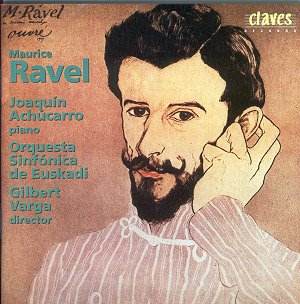There is no shortage of recommendable recordings of
the Ravel Concertos. In the G major whether the approach is of lambent
understanding or of exotic filigree, of neo-classicism explored or the
artificial exposed there’s a performance to suit every taste. Joaquín
Achucarro joined forces with Gilbert Varga and the Euskadi Symphony
Orchestra for a South American tour and this recording is the result
of their sympathetic collaboration; perhaps the more so as this, the
Basque National Orchestra, – Euskera is the name of the Basque language
- and Ravel were born in the French Basque town of Ciboure.
There’s nothing gestural about the playing and the
orchestra is especially attentive to some of Ravel’s more flagrant orchestration.
Achucarro neither overplays nor underplays the jazz element in the work
and remains essentially true to Ravel’s stated dictum that the concerto
was light-hearted and brilliant without the aim of profundity of utterance.
This is especially true in the adagio assai where there is no hint of
a smooth cantabile from the pianist; the music never congeals to mere
gorgeousness and the playing is alive to harmonic potential; what is
undeniably missing is the feeling of limpid lyricism that this movement
often draws out of pianists, the sense of an evolving song, a suspension
or rapture that moves inexorably toward orchestral interjection. There
is some notably fine and blowsy-bluesy woodwind playing in the finale
– generous, evocative but not vulgarly over personalized.
Many of these characteristics apply equally to the
Concerto for the Left Hand where Achucarro meets the considerable virtuoso
demands with no little skill; he catches the fragmentary, refractory
quality of the music its fusion and reconciliation of popular and jazz
elements with nostalgia as he does the final disturbing cadences which
are more properly reflective of man’s experience in war (the concerto
of course having been written for Paul Wittgenstein who had lost his
right arm in the War). There is also Ravel’s 1919 orchestration of Alborada
del Gracioso, originally written for piano in 1905. Colourful, charged,
beautifully orchestrated it is a welcome interludium before the Left
Hand Concerto’s darker impulse. A nice touch – orchestral players are
mentioned by name in the notes for their particular contributions.
Jonathan Woolf


